In the Heart of Africa, Humanitarian Mission in Angola:Transforming Lives in Lubango with Oral and Maxillofacial Surgery
- Angelo Freddo

- Jun 27, 2025
- 5 min read
Article from Brazil
1. Introduction
Angola is a country rich in culture and history, however it faces significant challenges in healthcare and human development. In a world where unequal access to medical care remains a harsh reality, humanitarian missions become essential in bringing medical and dental assistance to underserved communities. Recently, a team of Brazilian dentists, doctors and nurses embarked on a transformative journey to Lubango, Angola. Their mission? To provide a wide range of treatments and hospital surgeries in maxillofacial surgery, dentistry, otorhinolaryngology, gynecology, dermatology, and plastic surgery to patients suffering from infections, tumors, burns, and several other pathologies.
Located on the southwestern coast of Africa, Angola is abundant in natural resources and boasts a vibrant culture. However, due to its recent history as an independent nation, the country still faces severe challenges in its healthcare system. Lubango, the capital of Huíla Province, is a city marked by the resilience of its people. In another way, many residents lack access to adequate medical care, especially in specialized fields such as maxillofacial surgery. The region has a high prevalence of tumors, deformities, and infections like NOMA (Figure 1) - a bacterial infection that destroys the soft and hard tissues of the face and mouth.
Figure 1: A - Children diagnostic with NOMA; B – Woman diagnostic with ameloblastoma
In October 2024, a humanitarian mission linked to the NGO Kids Salvation from Minas Gerais, in partnership with Criança Feliz—an organization with 10 years of roots in Lubango—brought together 17 healthcare professionals who traveled there to provide essential treatments and surgeries across all these medical fields while also exchanging knowledge and experiences with local medical teams. This article reports the transformative journey of the Maxillofacial Surgery and Dental Surgery team from Porto Alegre, Rio Grande do Sul, and the profound impact they had on the lives of Angolan patients. Humanitarian missions like this one are vital in delivering medical care and support to vulnerable communities, often serving populations with little to no access to essential treatments. Driven by the desire to make a difference, the Brazilian team came together not only to provide medical and dental care but also to bring hope and dignity to those in greatest need. Planning for the mission began months in advance, involving countless meetings and discussions between visiting teams and local partners. The process included patient screening (Fig 2), securing lab and imaging tests, and fundraising to make these services possible. It was a complex puzzle where organization and teamwork were absolutely crucial.
Figura 2: A - Computed tomography 3D reconstruction image of a patient with extensive Ameloblastoma; B- Virtual surgical planning
We set off for Angola carrying, quite literally in our suitcases, surgical plans, 3D-printed models, pre-bent plates, fixation systems, bone grafts, surgical drills, and a substantial amount of medical supplies and instruments—all essentials we wouldn't have access to locally. But beyond the equipment, we carried unwavering dedication and a deep desire to help patients and transform lives through maxillofacial surgery. The mission consisted of eight intense days: visiting and consulting with communities in Lubango (Fig 3), providing dental care, and performing hospital surgeries. Each day was a blend of challenges and profound rewards as we worked to restore both function and dignity to our patients (Fig 4).
Figure 3: Kids Salvation Volunteers in the Tihiingue village with the children

2. Treatments and Surgeries
2.1 The maxillofacial surgery team focused on complex cases, including:
TMJ Ankylosis Treatment (Fig5)– Biconvex Arthroplasty (ABiP technique): Patients with temporomandibular joint (TMJ) ankylosis regained jaw mobility through this advanced surgical approach, restoring chewing function and improving quality of life.

Ameloblastoma Treatment (Fig6): Two mandibular resections and reconstructions with titanium plates were performed to remove extensive tumors while preserving jaw functionality.
Figure 6: Computed tomography image of a patient with extensive ameloblastoma
NOMA Treatment: Corrective facial plastic surgery with flap rotation, combined with alveoloplasty and tooth extractions, rehabilitated oral function in collaboration with the plastic surgery team.
Dental Procedures: Approximately 60 tooth extractions were performed to eliminate infections and relieve chronic pain, in addition to numerous restorative procedures.
Maxillofacial Prosthetics: A custom silicone nasal prosthesis was created for a patient with severe nasal deformity due to childhood trauma and infection.
The team treated both children and adults, addressing tumors, facial deformities, and urgent dental needs. Meanwhile, plastic surgeons, ENT specialists, gynecologists, dermatologists, and nursing staff provided critical care for burn victims and other conditions.
2.2 The Plastic Surgery Team’s Vital Role
Working alongside maxillofacial surgeons, the plastic surgery team reconstructed soft tissues using QUAISS flaps (local flap techniques) and treated burn scars, restoring both aesthetics and functionality. Their expertise was pivotal for:
Congenital deformities (e.g., cleft lip/palate revisions).
Trauma sequelae (e.g., nasal prostheses for childhood infections).
Burn rehabilitation, enabling patients to reintegrate into society.
3. Community Impact & the Importance of Maxillofacial Surgery
By the mission’s end:
340 procedures were performed.
5 training lectures were held for local healthcare workers.
300 children received health education to empower the community.
The mission prioritized knowledge transfer, offering hands-on training in advanced surgical techniques to Angolan doctors and dentists. Residents from other maxillofacial surgery programs also participated, strengthening local capacity. Donated surgical drills and handpieces were gifted to hospitals in Lubango and Benguela.
For patients, these interventions went beyond aesthetics—they restored basic functions like eating, speaking, and social integration. Many regained confidence and a renewed chance at life.
4. Team Reflections
"What struck me most was the courage and resilience of the children. They have almost nothing—no basic care in their communities. Some arrived for surgery without complaints or questions, stayed alone in the hospital, yet remained steadfast, accepting treatment and grateful for the chance to heal.” —Angelo Freddo
5. Conclusion
The Lubango mission was more than medical care; it was a bridge of solidarity. The Brazilian team returned home with full hearts, knowing that small actions spark profound change. This experience underscored the need to keep investing in global health initiatives, as every life touched moves us toward a fairer, healthier world.
Angola 2024 was a milestone, proving the power of international collaboration (Figure 7). And 2025 holds more…
We invite every reader to reflect on the suffering of those without access to care and to engage in global health—through donations, volunteering, or advocacy.
Figure 7- A- Local teams, plastic and maxillofacial teams together B- Oral and Maxillofacial team C- Children of the Tihiingue community in Lubango
Acknowledgments
The authors would like to very thankful to:
The local hospital teams in Lubango, whose dedication was indispensable.
Course participants, raffle buyers, and online donors—your support made this journey possible.
Sponsors: MB Soluções, Signo Vince, Implantec, Dental RS, and Ztrips, whose backing was vital.
Volunteers, families, and friends who believed in this cause.
Thank you for helping us transform lives - together, we can go further.
Authors:
Angelo Luiz Freddo1,2*, Camila Longoni2, Isadora Carvalho2, Cristian Teixeira2, Adriana Corsetti1,2.
1Oral and Maxillofacial Surgery Unit, Clinical Hospital of Porto Alegre (HCPA), Federal University of Rio Grande do Sul (UFRGS), Porto Alegre, RS, Brazil
2Department of Surgery and Orthopedics, School of Dentistry, Universidade Federal do Rio Grande do Sul, Porto Alegre, RS, Brazil
* Correspondence: angelofreddo@gmail.com






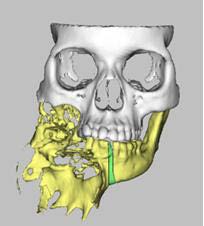
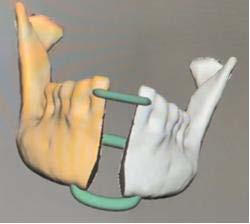
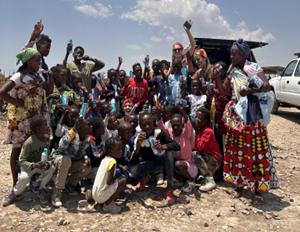
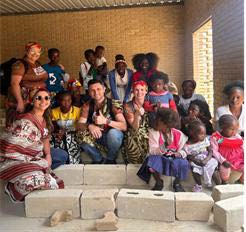
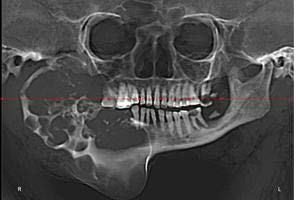
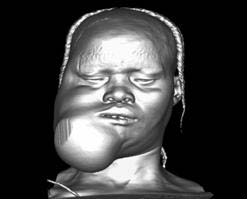




















Comments